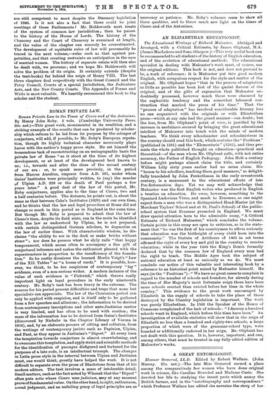Roman Private Law in the Times of Cicero and of
the Antonines. By Henry John Roby. 2 vols. (Cambridge University Press. 30s. net.)—This great work, monumental in its erudition, and a striking example of the results that can be produced by scholar- ship which refuses to be led from its purpose by the mirages of conjecture, will add, if possible, to Mr. Ruby's European reputa- tion, though its highly technical character necessarily plays havoc with the author's happy prose style. He set himself the tremendous task of reconstructing on an unimpngnable basis the private law of Rome "as it stood at the time of its highest development, or at least of the development best known to us; i.e., towards and after the close of the second century of our era : or, to speak more precisely, in the period from Marcus Aurelius, emperor from A.D. 161, under whom Gains' Institutes were principally written, to (say) the murder of Ulpian AD. 228 or the death of Paul perhaps a few years later." A good deal of the law of this period, Mr. Roby conjectures, applies also to the time of Cicero, two and a half centuries before. The distance, he points out, is about the same as that between Coke's Institutes (1628) and our own time, and he thinks that the law and legal procedure at Rome did not change so much in this period as in England in the same time. But though Mr. Roby is prepared to admit that the law of Cicero's time, despite its fluid state, can in the main be identified with the law as understood by 'Caplan, he is not prepared, with certain distinguished German scholars, to dogmatise on the law of earlier times. With characteristic wisdom, he dis- claims "the ability to see in the dark or make bricks without straw " ; nor does he possess what he slyly calls "that happy temperament, which seems often to accompany a fine gift of conjectural inference and makes the enthusiast pleased with the superstructure in proportion to the insufficiency of the founda- tion." So he curtly dismisses the learned Moritz Voigt's "Law of the XII. Tables" as "a house of cards." It is possible, how- ever, we think, to be too suspicious of contemporary " lay " evidence, even of a non-serious writer. A modern instance of the value of such evidence is "Pickwick," which throws really important light on legal procedure in the early nineteenth century. Mr. Ruby's task has been heavy in the extreme. The sources for his period present difficulties and traps that none but specialists can appreciate. The law of the Ciceronian period can only be applied with suspicion, and is itself only to be gathered from a few speeches and allusions ; the information to be derived from contemporary inscriptions and other ante-Justinian matter is very limited, and has often to be used with caution ; the mais of the information has to be derived from Gains's Institutes (discovered by Niebuhr in the Chapter Library of Verona in 1816), and, by an elaborate process of sifting and collation, from the writings of contemporary jurists such as Papinian, Ulpian, and Paul, as they appear in Justinian's "Digest." At every turn the temptation towards conjecture is almost overwhelming, and to overcome this temptation, and apply strict and scientific methods for the identification of passages disfigured and tortured for the purposes of a late code, is an intellectual triumph. The changes in Latin prose style in the interval between Ulpian and Justinian must, one would think, greatly have helped the work. It is not difficult to separate even the prose of Blackstone from that of his modern editors. The task involves a mass of intolerable detail. Small matters, such as the fact noted by Wlassak that the "Digest" often puts actio where Cicero uses judicium, may at any moment prove of fundamental value. On the other hand, insight, enthusiasm, sound judgment, and an unfailing grasp of legal principles are as


























































 Previous page
Previous page